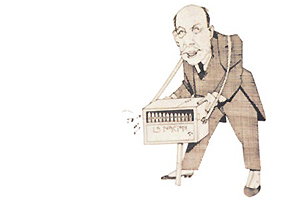He was born in Santiago on May 6th, 1860. His parents were Manuel Antonio Yañez and Maria Josefa Ponce de Leon.
He coursed his liberal arts studies at the Instituto Nacional (National Institute), and then enrolled in the Universidad de Chile, where he pursued a career in Law. He obtained his degree as a lawyer in 1883.
He soon became known as one of the most versed men around when it came to knowledge and interpretation of laws, and he also had very sound reasoning; the cases (cause) he won in court, where he was highly respected, are thanks to these qualities. His level of prestige was such that his opinions were considered decisive, and were sought out by professionals and magistrates for the resolution of complicated matters.
His unquestionable calling as a jurist led him to develop, along with Ricardo Passi Garcia, a Compilation of Current Laws and Decrees (1884), which was very well received.
At the same time, he published articles in several different newspapers, most of them judicial in nature (for example La libertad electoral (Electoral freedom) and the Revista forense (forensics magazine)). This passion for the articles he wrote transformed him into a figure of journalism at the time.
At the time he was practicing as a lawyer and working as a journalist, Eliodoro Yañez was appointed as the rapporteur for the Appeals Court of Santiago (1889).
He entered the liberal party and became a board member in 1893. One year later he was elected deputy for Valdivia and La Union, position he was reelected to on several occasions until 1903. He was vice-president of the Chamber of Deputies in 1894 and 1895. Also, he was elected senator for Valdivia in 1912 and reelected for several terms until 1930.
His parliamentary work was prolific, to such a point that it is said that while he remained in Congress, there were no bills that had not been proposed, studied or reviewed by him.
In addition to being a member of parliament, he was a State minister on several occasions. Between 1901 and 1902, under the administration of German Riesco, he held the position of minister of Foreign Relations, Cult and Colonization and he was subrogate minister of the Treasury.
Fifteen years later, he served as minister of the Interior for Juan Luis Sanfuentes’s government between 1917 and 1918. During this period he signed the law that introduced reforms to the Constitution of 1833.
He died in Santiago on July 26th, 1932.
Warning: Invalid argument supplied for foreach() in /www/wwwroot/www.icarito.cl/wp-content/themes/icarito-v1/template-parts/content-relacionadas.php on line 13








